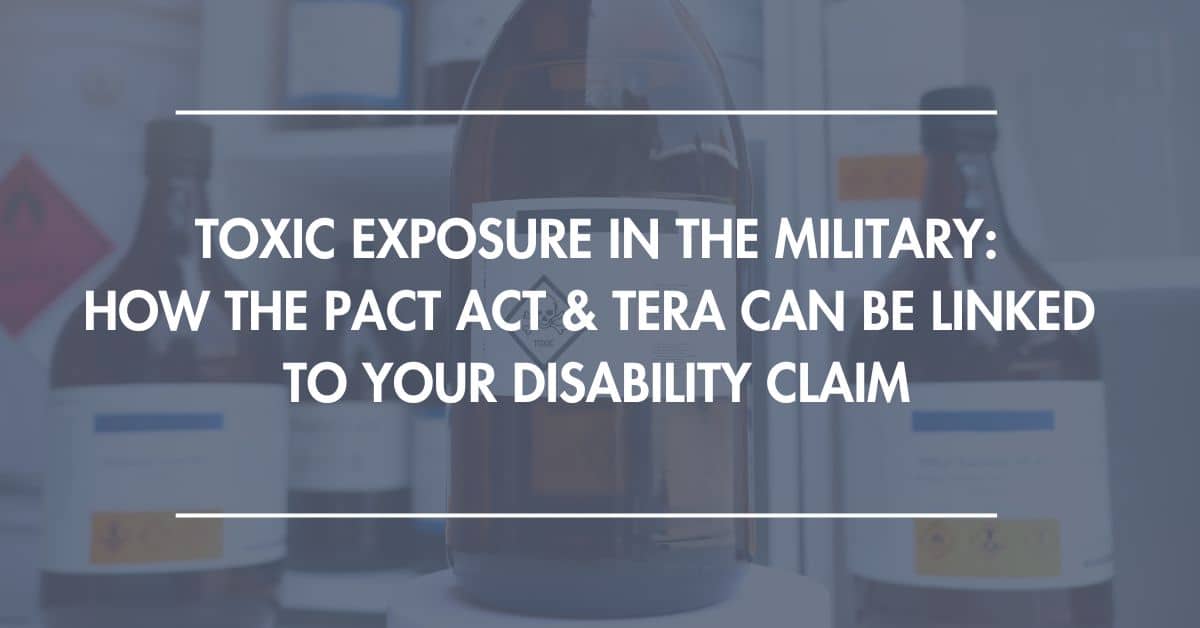
The PACT Act is a bill designed to help veterans who experienced toxic exposure in the military including, for some veterans, a presumption that certain conditions were caused by their toxic exposure. Per The Department of Veterans Affairs, “toxic exposure” refers to contact with harmful substances that can lead to adverse health effects.
Types of Toxic Exposure in the Military
Currently, the PACT Act refers to several different types of toxic exposure, including:
- Toxic Exposure Risk Activities (TERA): This includes exposure to hazardous substances during military service, whether by direct handling of the substances, or being stationed where toxic materials were stored.
- Agent Orange Exposure: Agent Orange is a toxic herbicide used by the US Military during the Vietnam War, for defoliation purposes. The PACT Act expanded the presumption of exposure from Vietnam to additional locations including Thailand, Cambodia, Laos, Guam, American Samoa, and Johnston Atoll
- Burn Pit and Airborne Hazards: burn pits were used by the US Military to dispose of waste materials in Iraq and Afghanistan, as well as other locations.
- Radiation Exposure: includes veterans who were exposed to ionizing radiation during their military service, including those who participated in nuclear testing, cleanup activities in Enewetak Atoll, or nuclear missions near Palomares, Spain and Thule, Greenland.
How Does TERA Relate to the PACT Act and Service-Connected Disabilities?
Put more simply, TERA, is the term used by the Department of Veterans’ Affairs to describe military activities that could expose service members to toxic substances. TERA includes, but is not limited to, air pollutants, chemicals, occupational hazards, radiation and warfare agents. What does this mean for your disability claim? Well, the PACT Act opened up the possibility of service connecting conditions that were not previously recognized as connected to time in the service. However, the down side is that we are seeing more and more decisions with denials for service connection, based on a lack of TERA exposure, where TERA is not asserted.
Now under the current regulations (38 USC § 1168) a C&P examination and medical opinion is required where all TERA is asserted, however, even if the VA concedes TERA exposure, that does not mean that they will agree that the veterans current disabilities are linked to the exposure.
However, in more recent decisions, it appears as though the VA will only produce an opinion for TERA exposure, and omit from consideration the additional theories of entitlement, which include direct service connection, a chronic condition that manifests after service, secondary service connection and presumptive service connection.
Filing for VA Disability Benefits Due to Toxic Exposure in the Military? We Can Help.
If you have been exposed to toxic substances during your time in the military, and the VA has denied you benefits for your conditions, reach out to our Veterans Benefits team at Bross & Frankel, P.A. Our dedicated team will review your claim thoroughly and will work to get you the benefits you deserve.
At Bross & Frankel, P.A. we are proud to represent the men and women who have bravely served our country. We work with veterans to help them get the benefits that they are entitled to, including disability compensation and related benefits. To learn more or to schedule a free claim review with a veterans disability attorney, contact our office today at (856) 795-8880 or fill out our online contact form.

Jennifer Stonage is a Senior Associate Attorney at Bross & Frankel, P.A. and primarily assists with the firm’s Veteran’s Benefits matters. She believes that the veterans who served our country are entitled to the help and compensation they are entitled to, and will put her knowledge to work to secure the highest possible compensation ratings. The VA process can be incredibly tricky to navigate. Let somebody who knows the system work to help you.